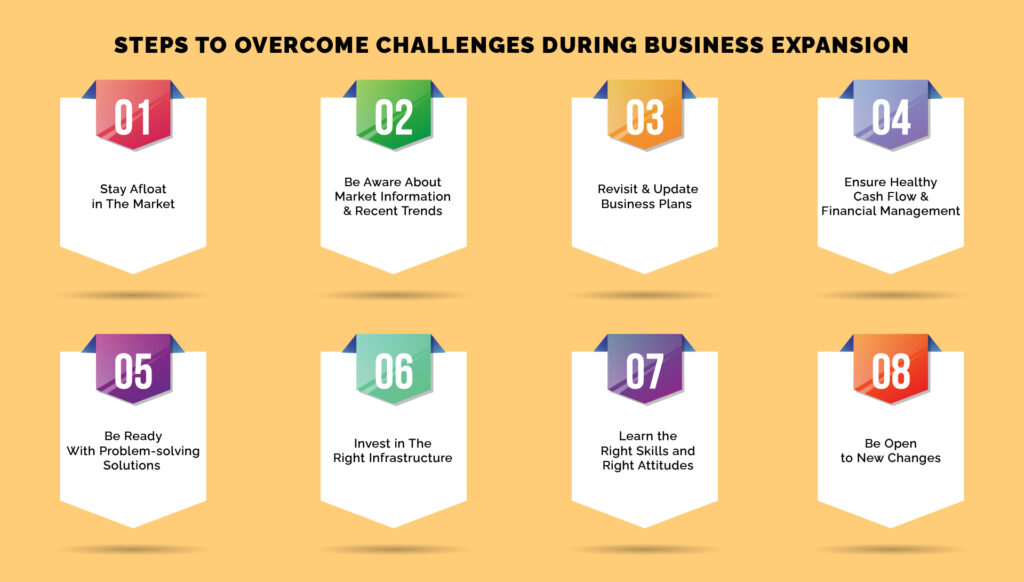So, you have decided to expand your business? If yes, then it is a good decision! But before expanding in to the new horizons, you will have to test the waters first. Expansion is one of the essential parts of any solid growth strategy. It is important to expand into new sales channels and leverage your operations. On the same time, it is also important to expand your product lines with new products to achieve the sustainable growth to fuel the business further.
Planning and executing a growth strategy to develop new markets and expand your business before your current market flattens out will surely help your business survive tough times. Also, it could give you a considerable edge in the market. However, growing businesses may face a range of challenges. As a business grows, different problems and opportunities call for different solutions. What worked a year ago might not be the best approach today.
Recognising those problems and overcoming the common pitfalls associated with growth is important. And this is if you need your business to grow and thrive in the future. It is crucial to ensure that what steps you take today shouldn’t create additional problems for the future. Effective leadership will help you in making the most of the opportunities, and creating sustainable growth for the future. Here are the few challenges and mistakes that most commonly affect growing businesses. Let’s discuss those in detail what you can do about them.
Staying Afloat in The Market research is not something that you do only when you launch your business. Business conditions change time to time, so your market research should be continuous as well. Else, you run the risk of making business decisions based on out-of-date information, which can lead to business failure.
The more you succeed, the more competitors notice and react to what you do in the business. A market-leading offer one day may be no better than average a few months later. Unfortunately, your loyal customers can be quick to shift gears and find alternative suppliers, who can provide them a better deal. This is a bitter truth but that is how the business ecosystem work.
As products and services age, sales growth and profit margins get contracted. Time to time market research or a research before launching new products will give you a clear perspective. An idea where your products are in customers’ lifecycles can help you work out how to maximise overall profitability. At the same time, you need to invest in innovation to build a stream of profitable new products to market.
‘‘
Effective leadership will help you in making the most of the opportunities, and creating sustainable growth for the future.
Understand Market Information and Recent Trends to Launch New Products
Information that are published can provide useful insights into market conditions and recent trends. As a growing business, your own experience can be even more valuable. You should build up an in-depth information of what customers want, their market behaviour, and your best marketing approaches that work well with customers.
Customer interaction on frequent occasions pays off. Taking the time to talk to key customers help in a big way. Your suppliers and other business partners can be important sources of market information. You should encourage your employees to share what they know about customers and the market. Effective IT systems can also make it easier to share and analyse key information such as customers’ purchasing behaviour, and preferences.
Furthermore, you can also extend your research to test customer reaction to new products. This you might do it yourself, or use a freelance researcher or market research agency. This will give you a quick reaction on your new products. This can be done on spot, or through digital platforms.

Revisit and Update Business Plans
The plans that you made for your business a year ago do not necessarily will make sense for you today. Market conditions continually change, so you need to revisit, update and upgrade your business plan regularly. Stay abreast by updating your guide charts to keep up with the market.
As your business grows, your strategy needs to evolve to suit your changed circumstances. Let’s say, after a time your focus may change from winning new customers to building profitable relationships and maximising growth with existing customers. Existing business relationships often have greater potential for profit and can pump in reliable cash flow. Newer relationships may increase turnover, but the profit margins may be lower, which may not be sustainable. At the same time, every business should to be cautious to new opportunities. There are obvious risks to relying solely on existing customers. Diversifying your customer base spreads those risks.
However, following the similar business model is not the only route to growth. There are other strategic options such as outsourcing or franchising that can provide better growth opportunities. It is important not to consider your current success means that you will automatically be able to take advantage of these opportunities. Every major move requires planning in the similar way as a new business launch.
Ask yourself whether new ideas suit your strengths and your overall vision of where the business is going. Always keep in mind that every new development including launching of new products brings with it changing risks. It is worth to consider regularly reviewing the risks you face in your business and developing contingency plans.
Cash Flow and Financial Management to Plan Launch of New Products
A healthy cash flow control is important for any business. For a growing business, cash constraints can be the biggest factor limiting growth and overtrading can be risky. Making the best use of your capital should be the key element in business planning and assessing new opportunities. With limited resources, you may need to pass up promising opportunities if pursuing them would mean starving your core business of essential funding.
Every element of working capital should be carefully controlled to maximise your free cash flow. Effective credit management and tight control of overdue debts are essential. You may also want to consider raising financing against trade debts. Good stock control and effective supplier management generally become important as businesses grow. Holdings of outdated stock may become a problem that needs periodic clearing up. You may want to work with suppliers to reduce delivery cycles, or switch to suppliers and systems that can handle on time delivery.
Planning ahead helps you to foresee your financing needs and arrange required funding as well. For growing businesses with new products, bring in outside investors to provide the equity needed to underpin further expansion can also be considered.
‘‘
Making the best use of your capital should be the key element in business planning and assessing new opportunities such as launching new products.
Problem-solving Solutions
New businesses often run-in perpetual crisis mode. Each day is a new challenge, which brings in an urgent need to resolve. The management spends most of their time in troubleshooting. But with the growth of your business, this approach simply doesn’t work. While a short-term crisis is always urgent, it may not matter nearly as much as other things you could be doing. Spending your time soothing an irritated customer might just help protect that one relationship. But instead focus on recruiting the right salesperson, who can lay the foundations of substantial new sales in the coming years.
With the growing business, you must also prepare yourself for new problems and new priorities. Let’s say, your business might be increasingly at risk unless you take steps to ensure your intellectual property is properly protected. If you are focusing on individual marketing campaigns, you might need to devote more capitals to develop your brand.
Recognising the key drivers of growth is a good way of understanding what to prioritise. A disciplined approach to management focuses on leading employees, developing your management team and building your business strategy. Instead of treating each problem as a one-timer, you develop systems and structures that make it easier to handle those problems in the future.
The Right Infrastructure
All businesses produce bank on large volumes of information such as financial records, interactions with customers and other business contacts, employee details, regulatory requirements and so on. And it can become a daunting task if not done without the right systems.
Responsibilities and tasks can be delegated as your business grows, but without solid management information systems you cannot control business effectively. The larger your business grows, the harder it is to ensure that information is shared and different functions work together effectively. Putting the right infrastructure in place is an essential part of helping your business to grow by launching new products.
Documentation, policies and procedures also become increasingly important. The informality that might work with a handful of customers is not practical in a growing business.
You need proper contracts, clear terms and conditions, effective employment procedures and so on. Many growing businesses find using established management standards one of the most effective ways of introducing best practice.
Quality control systems can be an important part of driving improvements and convincing larger customers that you can be relied on. Investing in the right infrastructure is an investment that will pay off both in the short and long terms. You benefit every day from more effective operations. If you ever decide to sell the business, demonstrating that you have well-run, efficient systems will be an integral part of proving its value.

Right Skills, Right Attitudes
Entrepreneurs are the driving force behind creating and growing new businesses. The abilities that can help you launch a business are not the same as those you need to help it grow. It is important not to fool yourself into valuing your own abilities too highly. The chances are that you will need training to learn the skills and attitudes required by someone who is leading growth.
To grow your business, you need to learn to delegate properly, trusting your management team and giving up day- to-day control of every detail. It is too easy to stifle creativity and motivation with excessive interference. As the business becomes more complex, you also need to develop your time, management skills and learn to focus on what is important.
As your business grows and you launch new products, you may need to bring in outsiders to help. You’ll want to delegate responsibility for particular areas to different specialists, or appoint a non-executive director or two to strengthen your board. As you start tackling a new opportunity, someone who has experience of that activity can be vital.
For many successful entrepreneurs, learning to listen to and take advice is one of the hardest challenges they face. But it may also be essential if you are going to make the most of your opportunities. Some recognise their own limitations and appoint someone else to act as managing director or chairman.
Open to New Changes
Complacency can be a major threat to a growing business. Assuming that you will continue to be successful because you have been doing good in the past is unwise. Regularly revisiting and updating your business plan can help remind you of the changing market conditions and the need to respond to them.
An up-to-date plan helps you identify what action you need to take to change your business and the way it operates. Let’s say, rejig suppliers who can grow with you and meet your new priorities. As your business grows, consistent quality and reliability may be more important than simply getting the cheapest offer. Renegotiating contracts to take account of increased volume.




